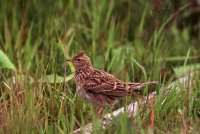New research to help farmland birds
The British Trust for Ornithology (BTO) has launched a new appeal today to help tackle the continuing decline of many once familiar farmland birds.

You might think that the decline of farmland birds is an old story and that the conservation efforts directed towards species such as Skylark and Yellowhammer mean that everything is now fixed. However, farmland bird populations have not recovered to former levels and while some populations have stabilised, others are continuing to decline. There is an urgent need to find out why things have not improved, which is why the British Trust for Ornithology has today launched its Farmland Bird Appeal.
BTO research has been central to the whole ‘farmland bird story’, from identifying declines, through diagnosing causes, to designing solutions for this conservation problem. The chief policy response has been to instigate agri-environment schemes. These schemes, which are funded through the EU Common Agricultural Policy, were set up to support farmers and land managers to farm in ways that support biodiversity, protect soil and water and enhance the landscape. Some of the scheme options were wholly or partly designed to provide resources for declining farmland birds.
Previous BTO research has highlighted limitations in some of the schemes, prompting modifications to improve their design. Although agri-environment schemes have succeeded in reducing the rates of decline of a range of farmland bird species, we have yet to see populations recover to former levels and, for some species, the rate of decline has increased over recent years.
Dr Gavin Siriwardena, Principal Ecologist at BTO, commented, “Many of us thought we had solved the problem of farmland bird decline, but the latest evidence suggests more research is needed to find conservation solutions that really work. It is evident from our latest results that there is still much that we do not understand about how to reverse the declines, making our Farmland Bird Appeal all the more important. If we can secure the funding then we can address some key questions and offer the best advice for farmers to deliver biodiversity benefits.”
More than 60% of land in the UK is agricultural, so in many ways farmland is the British countryside. If we want to maintain our farmland bird communities, a central part of this countryside, then we need to understand how to make effective conservation efforts to deliver more favourable outcomes.
Gavin Siriwardena said, “Many farmers invest a lot of time and effort into protecting wildlife on their farms; we need to ensure that the available agri-environment scheme options work for birds and are also practical for the farmers who will implement them.”
You can donate here
How you can help
More than 60% of countryside is farmland. Agri-environment schemes are the approach to providing management schemes to improve the farmed environment. With even less funding available for research and development of these, we need your help to carry out this work to understand why the AES measures aren’t delivering results and find solutions that work for farmland bird species.
Download the Farmland Bird Appeal brochure for more information (PDF).
Notes for Editors
1. The BTO is looking to raise £100k through the appeal, which will be used to answer a suite of questions, including some that look at the declining Skylark – a species whose populations fell by 63% between 1967 and 2012. BTO data show that Skylarks have been affected negatively by agri-environment scheme options but we don’t yet know why. One potential project would see BTO researchers using GPS tracking devices to find out how Skylarks use today’s farmed landscape so that they can then identify where problems are occurring.
2. The BTO is the UK’s leading bird research charity. A growing membership and up to 60,000 volunteer birdwatchers contribute to the BTO’s surveys, collecting information that underpins conservation action in the UK. The BTO maintains a staff of 100 at its offices in Thetford, Stirling, Bangor (Wales) and Bangor (Northern Ireland), who analyse and publicise the results of surveys and projects. The BTO’s work is funded by BTO supporters, government, trusts, industry and conservation organisations. www.bto.org
Contact Information
Dr Gavin Siriwardena
(BTO Principal Ecologist)
Office: 01842 750050
(9am to 5.30pm)
Email: gavin.siriwardena@bto.org
Paul Stancliffe
(BTO Media Manager)
Office: 01842 750050
(9am to 5.30pm)
Mobile: 07585 440910 (anytime)
Email: press@bto.org
Images are available for use alongside this News Release.
Please contact images@bto.org quoting reference 2015-19
The BTO has an ISDN line available for radio interviews.
Please contact us to book an interview
Office: 01842 750050

Recent Comments